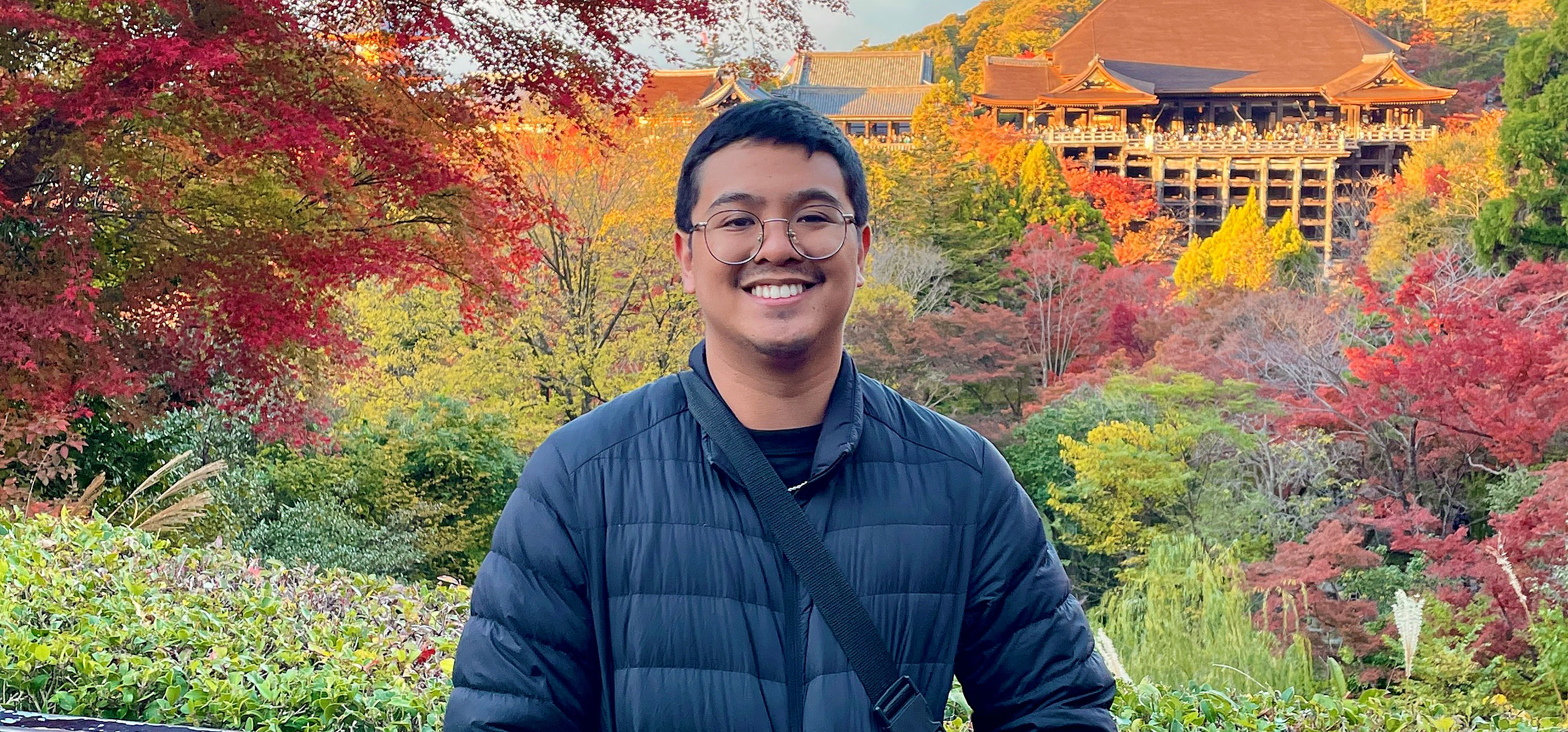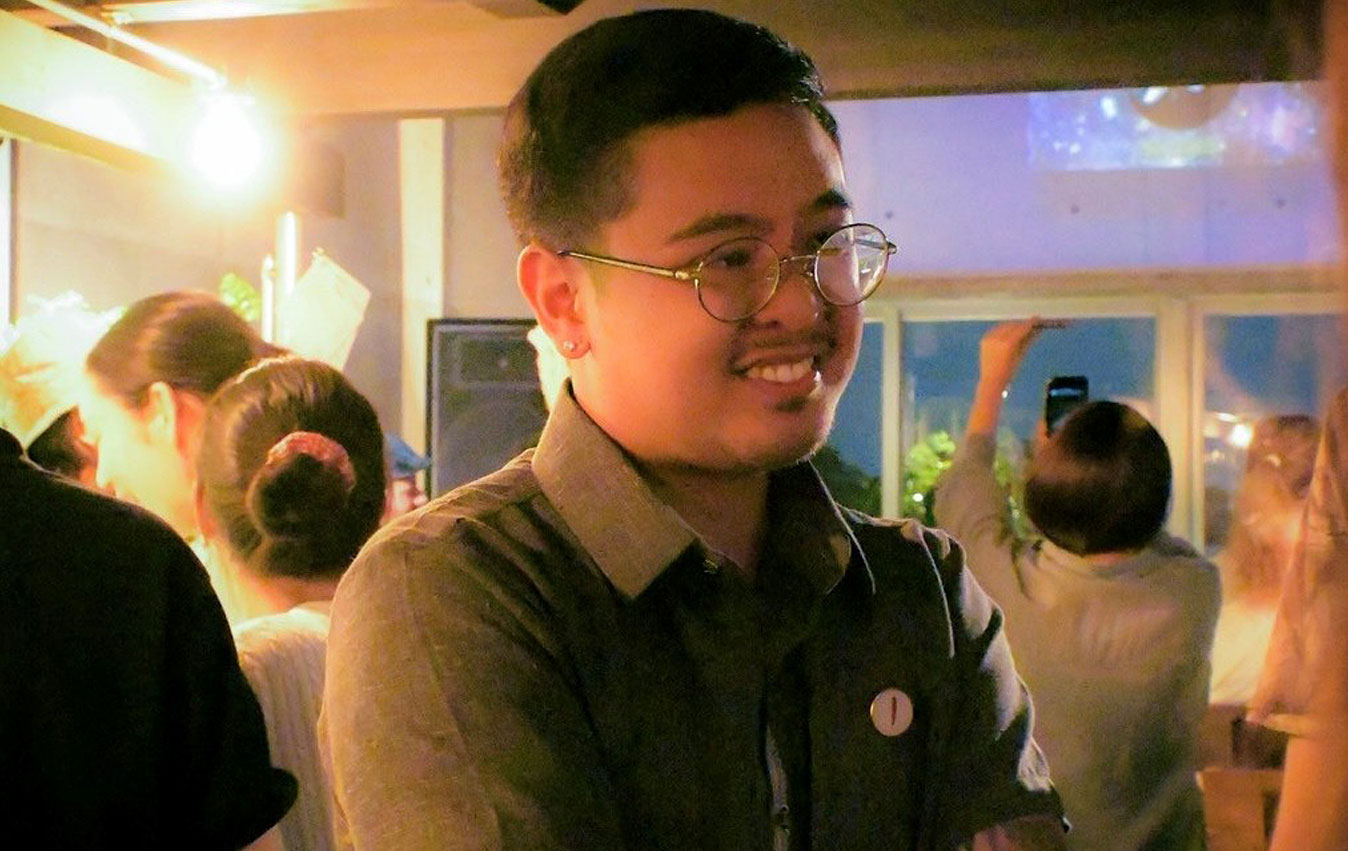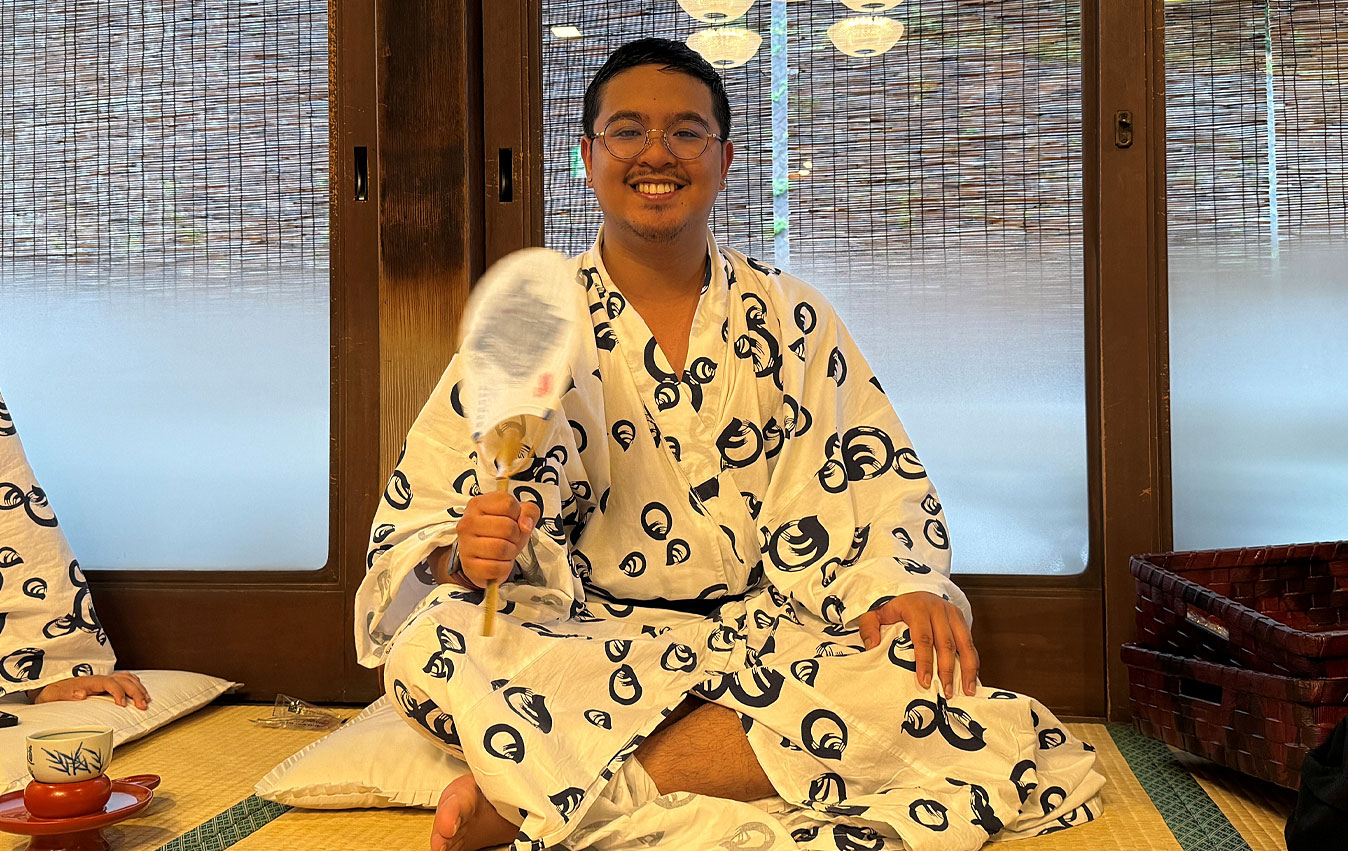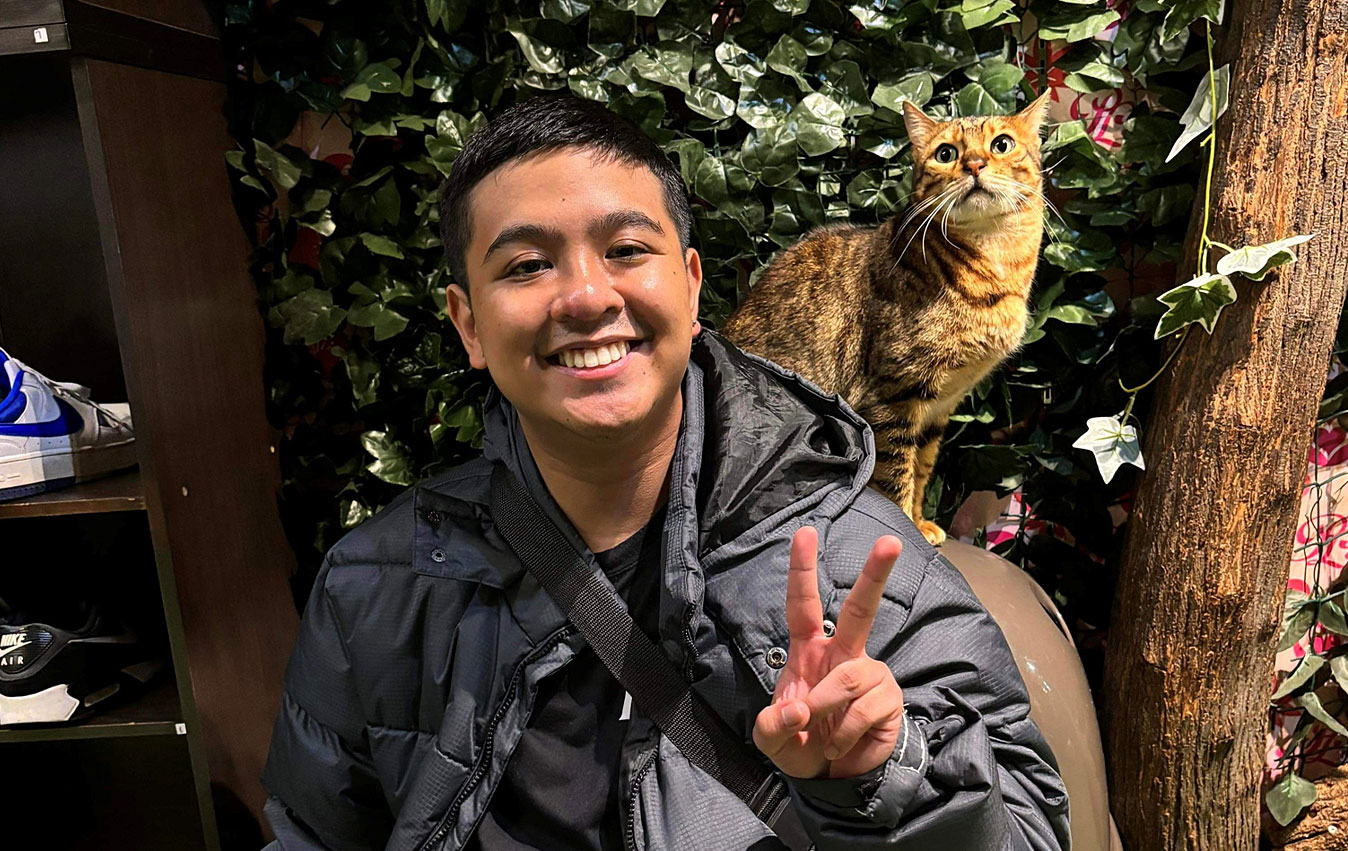
Studying Peace in Kyoto: Two Years Including a Hiroshima Seminar and Internship at the Kyoto Museum for World Peace
Miles Brian Mariano-Ortilla
Fourth-year Joint Degree Program (AU-home)
We interviewed Miles Brian Mariano-Ortilla, a fourth-year student in the Joint Degree Program (AU-home), about his two years of study and student life at Ritsumeikan University, as well as his future career path after graduation.
What motivated you to apply to the American University-Ritsumeikan University Joint Degree Program?
MilesI was initially motivated to apply to the American University-Ritsumeikan University Joint Degree Program due to my interest in Asia-Pacific diplomacy, specifically regarding the relationship among the United States, Japan, and the Philippines.
I learned about the relationship among these countries at a young age, since my grandmother lived in the Philippines during the American and Japanese occupation periods. Her stories and experiences with these two countries inspired and intrigued me to learn more about colonialism, imperialism, and how these concepts operate from an international relations perspective. Additionally, as somebody born and raised in Florida, I was interested in studying in such different places from my hometown.
By exploring and living in these two cities across the globe, I realized that I could develop a more global perspective and experience different cultures than I was accustomed to.

What was the most fulfilling activity you participated in while at Ritsumeikan University?
MilesI have participated in numerous fulfilling activities while at Ritsumeikan University, including joining the boxing team and facilitating an event led by Dr. Nargis Kassenova from Harvard University. However, the most fulfilling of these activities was attending the Peace Studies Seminar in Hiroshima last year.
Accompanied by a cohort of my peers, I spent a few days conducting fieldwork in Hiroshima during the 79th anniversary of the atomic bombing. Among the activities that we participated in during this fieldwork were visiting the Hiroshima Peace Memorial Museum, attending the annual Hiroshima Peace Memorial Ceremony, and meeting with international organizations such as the United Nations Institute for Training and Research (UNITAR).
MilesHowever, the most fulfilling moment of this fieldwork was when we attended an event where we listened to the testimonies of a hibakusha or atomic bomb survivor. Her testimonies during and after the atomic bombing of Hiroshima were visceral and made the event real rather than merely something that we read in history books. It helped me better visualize the human cost of what we study in international relations, especially since it is a common pitfall to view nation-states from the macro level and as monoliths in our field of study. Most importantly, it made me realize the importance of understanding and empathy in pursuing a course of study like international relations, especially when dealing with such sensitive subject matter as hibakusha.
Could you tell us a few episodes about what impressed you in Japan, Kyoto or Ritsumeikan University?
MilesWhile there have been many things that impressed me when I moved to Kyoto, such as the reliability of public transportation and other public services, I have been most impressed by the diversity and complexity of Japanese society. My perception of Japanese society before moving to Japan was that it was homogeneous with little racial or ethnic diversity. However, I have come to learn and realize that while living in Japan, it is indeed rich in diversity, not only in terms of race or ethnicity, but also in thoughts and ideas.
During my two years at Ritsumeikan University, I met many great individuals both in and out of the classroom from Japan and other countries and cultures that I would not have met otherwise, with whom I developed lasting friendships and professional relationships. I have been able to discuss a wide range of topics with these people, from world politics and history to sports and popular culture. Learning from the experiences and views of people from around the world has helped me diversify my own perspectives on important issues.

You’ve done an internship at the Kyoto Museum for World Peace, Ritsumeikan University. Please share your experience there.
MilesMy internship at the Kyoto Museum for World Peace for the past two semesters has been very transformative for me. My primary duty as an intern at the Kyoto Museum for World Peace was translating the testimonies of people living in the Asia-Pacific region before and during the Pacific War. Reading and translating the testimonies of everyday people from occupied Korea to the Philippines and Taiwan helped me develop a certain consciousness of the shared struggle of oppressed people, not only under imperial powers during the Second World War but also in the present day. In addition to these primary duties, I also helped plan and facilitate different events for students and museum guides at the Peace Museum.
One of these student events included a visit from university students from Hong Kong, which comprised a tour of the Peace Museum and a subsequent peace dialogue on their views of the youth’s role in promoting peace in their communities and around the world. This event further helped me understand the views of other students worldwide and develop a greater appreciation for cross-cultural dialogue. An example of a museum guide event that I enjoyed participating in was the “mono-talk” workshop, where other student staff and I brought an item that holds sentimental value for us. With our identities unknown to them, the museum guides attempted to guess what kind of person owned the item and what meaning it held for them. This workshop helped facilitate openness among the museum guides to understanding the value of artifacts and the vulnerability of expressing the sentimental value of certain items to a group of people.
What are your career intentions or thoughts after graduation?
MilesMy career intentions after graduation are to pursue a master’s degree in Philippine Studies at the University of the Philippines Asian Center. Without a doubt, my experiences learning and conducting research at the American University and Ritsumeikan University have been formative in shaping my career intentions, as I have gained a deeper understanding of the research topics that interest me and developed the methods by which I can conduct research.
I intend to continue my career in academia for several reasons, the most important of which is to contribute to the ever-growing body of knowledge that results from the craft of research. I specifically intend to engage in research on postcolonial studies in the Philippines, analyzing the long-lasting effects of colonialism in the Philippines and Southeast Asia in the present day. While this is a broad topic to research, I hope to utilize the knowledge I gained at American University and Ritsumeikan University on the history and effects of colonialism to refine my research.

September 2025
MORE INTERVIEWS
-
International collaboration is not merely an ideal, but something that is both achievable and essential
Tran Duc Tuan (Steven)
Honda (Graduate School of International Relations Alumnus 2015)2026.2.13
alumni|
-
Zemi Research Convention 2025 “Where do we find the laughter?”
JDP Team
(Team name: The Japarican: Trans-Pacific Humor Accord)2026.2.3
academics|jdp|openseminar|
-
Diversifying opportunities and improving oneself by crossing borders
Jameel Mikaheel Yamaguchi
Fourth-year Global Studies Major2026.1.26
studyabroad|international|gs_major|
-
I participated in the Peace Studies Seminar and engaged in meaningful discussions with peers who shared a commitment to deepening our understanding of peacebuilding and broadening our perspectives.
ONG Kristen Valeria
Second-year Global Studies Major / International Student from Singapore2025.11.5
studentlife|academics|gs_major|
-
The Bangkok International Organization Training Program Taught Me the Importance of Understanding Regions from a Broad Perspective — I Aspire to Build a Career in International Politics
RINALDI Christian Giuseppe
Second-year Joint Degree Program (AU-home)2025.10.22
academics|international|jdp|
-
Developing my Japanese proficiency enabled me to engage in a wide range of experiences during my time in Japan.
DAO NGUYEN BAO Ngoc
Third-year Global Studies Major / International Student from Vietnam2025.9.26
studentlife|international|gs_major|